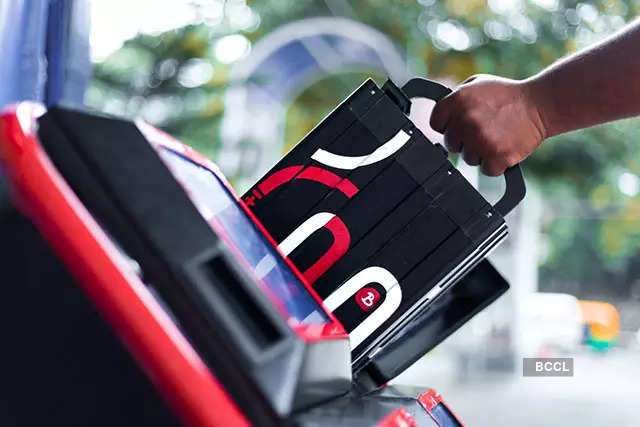India’s WTO stand worries Big Tech; US foray for InMobi’s Glance
Also in this letter:
■ Android lock-screen platform Glance to launch in the US soon
■ Tencent buys 0.72% stake in Flipkart from Binny Bansal
■ Automation picks up pace amid high attrition, inflation
Big Tech jittery over India’s stand on customs duty moratorium

Big Tech companies and policy groupings are concerned about India’s stand on not renewing a World Trade Organisation (WTO) moratorium on customs duty for electronic transmissions. These firms are pushing to extend the moratorium – discussions for which began on June 12 – by another two years.
The Ministry of Commerce and Industry has said India and South Africa made several joint submissions highlighting the “adverse impact” of extending the moratorium.
What this means: Executives at Big Tech firms told us that not extending the moratorium could be extremely problematic as there is no way to properly assess what constitutes an electronic transmission — with no clear definition available. It could also adversely affect India’s outsourcing industry, they said.
A senior executive at a social media conglomerate said the lifting of the moratorium would mean countries could interpret ‘electronic transmission’ differently, which would, in turn, lead to “a mess of understanding of who owns what intellectual property and whose rights are applicable where.”
“The key issue, when it is a trade policy question, is what type of transfer of information is captured? Does it go beyond streaming services into email, transfer of data between companies and include voicemail and phone communication in general? That question is wide open,” Simon Evenett, professor of international trade and economic development at the University of St. Gallen, told us.
‘Short-sighted move’: A senior executive at a Big Tech firm said that though there have been attempts to define electronic transmissions, the discussions have not been fruitful so far.
“To not renew the moratorium because there is no definition of electronic transmissions is a short-sighted move. We are not asking for this moratorium to be made permanent but only asking for an extension of two years when the next ministerial conference occurs,” the executive said.
Android lock-screen platform Glance to launch in the US soon

Glance, a part of mobile advertising giant InMobi Group, is looking to launch in the US market as soon as the next quarter, and has already begun hiring for the vertical. Glance offers a customisable lock screen on Android and comes preinstalled with some phones.
InMobi will also take its live commerce offerings, including Roposo, and its recent gaming acquisition Gambit to the US market over the course of the year.
Opportunity knocks: Naveen Tewari, founder and chief executive, InMobi, said, “We see an opportunity to not just build Glance in the US but also live creator commerce. We believe there’s a big play in gaming which we will also take to the US.”
B2C to the fore: Apart from its core mobile advertising business-to-business (B2B) vertical, InMobi Group also houses Glance, live commerce platform Roposo, ecommerce platform Shop101, and gaming company Gambit, which form its business-to-consumer (B2C) business.
In just one-and-a-half years, the B2C business has come to contribute almost 33-35% of InMobi’s overall revenues, up from 10-15% earlier.
Glance is also looking to bolster its monetisation play in India by launching digicommerce in the next three months. It is also looking to launch tokens, including non-fungible tokens (NFTs), in the next six months.
Apple’s lock screen revamp: Last week, Apple announced at its Worldwide Developer Conference a much-improved lock screen for the iPhone, with increased personalisation.
This translates, albeit indirectly, into increased competition for Glance, which offers lock screen customisation on Android. It has even tied up with manufacturers such as Samsung and Xiaomi and thus comes preinstalled with many of their phones.
Asked about Apple’s move, Tewari told us, “This development does not change anything so far as our plans for this market are concerned. We are backed by Google, which owns the Android ecosystem, and we will continue to march ahead.”
Tencent buys 0.72% stake in Flipkart from Binny Bansal

Chinese technology conglomerate Tencent has bought a stake worth $264 million (about Rs 2,060 crore) in Flipkart from its cofounder, Binny Bansal, through its European subsidiary, according to official documents.
Called it:We reported in December 2021, citing sources that Bansal had sold a part of his shareholding, amounting to $200-250 million, when Flipkart last raised funds in July. Bansal, who cofounded Flipkart with Sachin Bansal in 2007, sold shares to existing investor Tencent Holdings, they added.
The transaction was completed on October 26, 2021 and was shared with the government authorities at the start of the current financial year.
Bansal now holds around 1.84% in Flipkart after selling part of his stake to Tencent Cloud Europe BV.
The Tencent arm holds 0.72% in Flipkart, a stake valued at around $264 million based on Flipkart’s most recent valuation of $37.6 billion from July 2021.
TWEET OF THE DAY
Automation picks up pace amid high attrition, inflation

The automation of repetitive tasks is coming to the rescue of IT companies amid high attrition rates and cost cuts in a high-inflation environment.
Automation has gained traction as startups and global enterprises reduce costs and freeze hiring as they brace for a period of high-interest rates.
Global IT research firm Gartner has predicted that the market size for digital automation will touch around $600 billion in the current fiscal year, a 35% annualised growth rate over five years.
Infosys, India’s second-largest software services firm by revenue, has accelerated automation to bring in efficiency and productivity through 24,000 bots.
The company has seen efficiency improve by 10-20% each year, both internally and externally, due to its automation solutions.
Industry wants longer-range vehicles included in battery-swapping policy

Battery swapping for electric vehicles (EVs) should focus on longer-range vehicles, as lower availability of docks initially would force users to make detours for a swap, industrialists said.
This came in response to a draft policy by government think tank Niti Aayog.
They, however, agreed that swapping was a welcome move to jump-start the adoption of EVs despite fundamental questions about its viability.
IT industry body Nasscom, in its response to Niti Aayog’s Draft Battery Swapping Policy, has recommended that batteries with a higher range, at about 80-100 kilometres a swap, should be encouraged to meet demand to go longer distances “without having to take detours to find a battery swap dock.”
Nasscom, which has among its members EV brands such as Ather Energy, has also pointed out that EV riders are likely to rush to a swap dock due to “range anxiety”, meaning users could initiate swap before the battery runs out.
Other Top Stories By Our Reporters

What’s the tweak in the IT Rules tale? The Ministry of Electronics and Information Technology recently republished a draft of the proposed changes to the Information Technology Rules, 2021. The surprise move caused a flutter among social media companies as well as privacy and security experts. We explain the key changes in the rules.
India’s GCCs are evolving from captives to capability centres: Global capability centres (GCCs) are coming up at a fast clip in the country. So far this year, around 30 companies have opened GCCs, or captives as they are commonly known, in India. Initially, these captives provided back-office or customer support, and product innovation or data and analytics support hardly ever took place.
India centre drives R&D at Mercedes-Benz: German carmaker Mercedes-Benz’s India research centre is now its largest R&D facility outside its home market and is driving a significant part of the company’s technology development, more than two decades after it started out as a captive unit.
Global Picks We Are Reading
■ Some ads play on streaming services even when the TV is off, study finds (WSJ)
■ She tracked her boyfriend using an AirTag — then killed him, police say (The Washington Post)
■ “Not worth it”: why Grab is shedding drivers and frustrating customers in Vietnam (Rest Of World)
For all the latest Technology News Click Here
For the latest news and updates, follow us on Google News.

